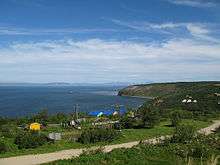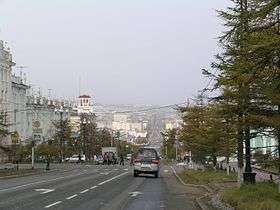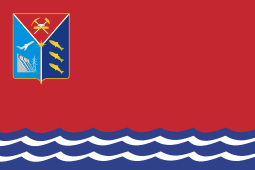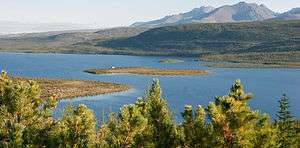Magadan Oblast
| Magadan Oblast Магаданская область (Russian) | |||
|---|---|---|---|
| — Oblast — | |||
| |||
|
| |||
| |||
|
| |||
| Political status | |||
| Country | Russia | ||
| Federal district | Far Eastern[2] | ||
| Economic region | Far Eastern[3] | ||
| Established | December 3, 1953[4] | ||
| Administrative center | Magadan | ||
| Government (as of June 2014) | |||
| • Acting Governor[5] | Vladimir Pechyony[6] | ||
| • Legislature | Oblast Duma[7] | ||
| Statistics | |||
| Area (as of the 2002 Census)[8] | |||
| • Total | 461,400 km2 (178,100 sq mi) | ||
| Area rank | 11th | ||
| Population (2010 Census)[9] | |||
| • Total | 156,996 | ||
| • Rank | 81st | ||
| • Density[10] | 0.34/km2 (0.88/sq mi) | ||
| • Urban | 95.4% | ||
| • Rural | 4.6% | ||
| Population (January 2014 est.) | |||
| • Total | 150,312[11] | ||
| Time zone(s) | MAGT (UTC+11:00)[12] | ||
| ISO 3166-2 | RU-MAG | ||
| License plates | 49 | ||
| Official languages | Russian[13] | ||
| Official website | |||
Magadan Oblast (Russian: Магаданская область, tr. Magadanskaya oblast; IPA: [məgɐˈdanskəjə ˈobləsʲtʲ]) is a federal subject of Russia (an oblast) in the Far Eastern Federal District. It borders with Chukotka Autonomous Okrug in the north, Kamchatka Krai in the east, Khabarovsk Krai in the south, and with the Sakha Republic in the west. Its administrative center is the city of Magadan. Population: 156,996 (2010 Census).[9]
History
Magadan Oblast was established on December 3, 1953[4] in what had popularly been known as Kolyma. As a result of considerable raw resources, especially gold, silver, tin, and tungsten deposits, mining activities and road building had been developed during the Stalin era in the 1930s and 1940s under the coordination of Dalstroy and its forced labor camps. Upon Stalin's death, Dalstroy was disbanded and the regional administration took over many of its former responsibilities.
From then on, paid labor replaced most of the convict-based manpower, attracted by the region's rapid economic expansion, especially the gold-mining interests.
The indigenous peoples of the region, including the Evens, Koryaks, Yupiks, Chukchis, Orochs, Chuvans and Itelmens, who had traditionally lived from fishing along the Sea of Okhotsk coast or from reindeer herding in the River Kolyma valley, suffered from the industrialization of the area but were able to rely on institutional support until 1987 when Perestroika started to cause many of the older structures to close. As a result, many of those who can no longer rely on traditional sources of income are now unemployed.[14]
Chukotka Autonomous Okrug was formerly administratively subordinated to Magadan Oblast, but declared its separation in 1991.
Terrain and wildlife

Magadan Oblast consists principally of mountainous desert, tundra, and taiga. The southern part of the region is partly forested with birch, willow, mountain ash, larch and alder.
The animal species in the south include snow sheep, reindeer, moose and brown bears. There are also many varieties of birds, including ducks and seabirds. The Sea of Okhotsk has rich fishing grounds for pollock, herring, cod, flounder and salmon, as well as crabs and shellfish.
Economy
The economy is centered on mining interests for gold, silver and other non-ferrous metals. The city of Magadan is the only large industrial center. Agriculture is not well developed in the region. On April 2014 the Russian government has endorsed bills for extending the operations of the Special Economic Zone (SEZ) in Magadan Oblast through to December 31, 2025.[15]
Mining
Magadan Oblast is considered one of the world's richest mining areas. Gold is the region's main resource, although silver and tin deposits are also being developed. There are nearly 2,000 placer gold deposits, 100 gold ore deposits, and 48 silver ore deposits in the territory.[16]
Recently, there has been interest in exploiting the coal resources in the region. Over the medium term, there seem to be excellent opportunities for petroleum and natural gas exploitation.
Fishing
The fishing industry is the region's only food sector and is second in importance after mining. The 600,000 square kilometers (230,000 sq mi) area of the Sea of Okhotsk that borders on Magadan Oblast is one of the most productive regions of the world's oceans. Magadan Oblast has more than 15,900 kilometers (9,900 mi) of coastline and 29,016 kilometers (18,030 mi) of rivers of commercial importance. The catching vessels of the oblast's fishing companies operate mainly in Russia's economic zone, the Sea of Okhotsk and the Bering Sea, and to some extent in the Sea of Japan. Most of the catch comes from coastal waters. Fishing industry companies are concentrated in Magadan, Ola, Yamsk, and Evensk. The most important commercial fish are pollock, herring, cod, navaga (a member of the cod family), flounder, and various kinds of salmon. Crabs, squid, shrimp, and whelks are also caught.[16]
Agriculture
Owing to the severe climate, agriculture is Magadan Region's least developed economic sector; as a result, 50% of all food products must be supplied from outside. The agricultural complex consists of companies producing agricultural products, the food and processing industries, a production infrastructure, and farm enterprises. The particular areas of specialization are reindeer herding, fur farming, and traditional hunting, fishing, and fur trapping activities. Companies involved in food processing and production include Gormolzavod, a distillery, a pasta factory, a sausage factory, the Dukcha state poultry farm, and the Khasynsky state farm.[16]
Present situation
Unfortunately, despite these rich natural resources, the economy has not prospered as much as might have been expected in recent years. The severe climate and poorly developed infrastructure are partly to blame, but the difficult transition from Soviet times has led to the collapse of a number of companies with the result that many inhabitants have left the region. Recently, there do seem to have been renewed efforts to encourage foreign investment which could lead to improvements in the economy. Indeed, on a visit to Magadan in November 2005, President Vladimir Putin supported the extension of special tax advantages for the region in order to encourage gold exploitation.[17]
While official unemployment in Magadan Region is around 12%, it is higher in remote areas where a large segment of the population is indigenous (16–18%). The actual unemployment figures must be much higher, because many people who live in remote areas have no opportunity to register as unemployed. In some places unemployment is probably almost 20%, although this is not officially recognized. While reindeer herding is ruined in many places, and fishing quotas are nearly impossible to get, the fraction of indigenous workers in industry and mining is almost invisible.
Administrative divisions
Demographics
Population: 156,996 (2010 Census);[9] 182,726 (2002 Census);[18] 542,868 (1989 Census).[19]
- Total Fertility Rate: 1.344 children per women (2008)
- Urban TFR: 1.300 children per women (2008)
- Rural TFR: 5.879 children per women (2008)
- Infant Mortality Rate: 14.2 per 1000 births (2007)
- Urban Infant Mortality Rate: 12.9 per 1000 births (2007)
- Rural Infant Mortality Rate: 34.8 per 1000 births (2007) (highest in all of Russia).
- Vital statistics for 2012
- Births: 1 917 (12.4 per 1000)
- Deaths: 1 943 (12.6 per 1000) [20]
Total fertility rate:[21]
2009 - 1.54 | 2010 - 1.44 | 2011 - 1.48 | 2012 - 1.65 | 2013 - 1.69 | 2014 - 1.66 | 2015 - 1.64(e)
Ethnic groups: According to the 2010 Census, the ethnic composition was:[9]
- 127,936 Russians (84.1%);
- 9,857 Ukrainians (6.5%);
- 2,635 Evens (1.7%);
- 1,415 Tatars (0.9%);
- 1,121 Belarusians (0.8%);
- 4,930 people were registered from administrative databases, and could not declare an ethnicity. It is estimated that the proportion of ethnicities in this group is the same as that of the declared group.[22]
Demographics for 2006 and later

Magadan is a federal subject that has the highest rate of depopulation in the Russian Federation. Its population, which stood at 384,525 in 1991, stood at 165,820 on January 1, 2008 (according to the State Committee of the Russian Federation on Statistics), falling at a rate of around 2% per year. The rural population, which had stood at 59,151, was just 8,833 in 2008 and decreasing at a rate of around 10% per year. Entire villages are being emptied out and the population of the rural areas of the districts is simply disappearing. The rural population of Yagodninsky District was reduced from 13,843 (1991) to 445 (2007). The Omsukchansky District saw its rural population plummet from 1,301 to 79. Especially extreme is the example of Susumansky District, where the rural population almost disappeared: from 9,764 in 1991 to just 116 in 2007. Emigration is evident from the fact that for the 20-24 age group, there were only 66 females living in rural areas, compared to 202 males. Male life expectancy for rural areas rose to 53.73 years in 2006 from 51.88 in 2005.[23]
Although Magadan Oblast is a part of the program of resettlement of ethnic Russian families,[24] not a single such family from the near abroad has so far settled in the Oblast.
| District | Population | Urban | Rural | Births | BR | Deaths | DR | NGR |
|---|---|---|---|---|---|---|---|---|
| Magadan Oblast | 171,569 | 161,937 | 9,632 | 1820 | 10.70 | 2242 | 13.20 | -0.25% |
| Magadan | 107,265 | 107,265 | 0 | 1171 | 10.90 | 1292 | 12.10 | -0.12% |
| Olsky District | 11,463 | 7,917 | 3,546 | 124 | 10.90 | 192 | 16.90 | -0.60% |
| Omsukchansky District | 5,993 | 5,887 | 106 | 51 | 8.60 | 61 | 10.30 | -0.17% |
| Severo-Evensky District | 3,129 | 1,797 | 1,332 | 29 | 9.50 | 55 | 18.10 | -0.86% |
| Srednekansky District | 4,193 | 2,984 | 1,209 | 35 | 8.70 | 74 | 18.40 | -0.97% |
| Susumansky District | 11,166 | 10,952 | 214 | 101 | 9.30 | 132 | 12.20 | -0.29% |
| Tenkinsky District | 6,523 | 4,433 | 2,090 | 74 | 11.60 | 96 | 15.00 | -0.34% |
| Khasynsky District | 9,147 | 8,587 | 560 | 108 | 12.00 | 140 | 15.50 | -0.35% |
| Yagodninsky District | 12,690 | 12,115 | 575 | 127 | 10.40 | 200 | 16.30 | -0.59% |
After 2011 Tōhoku earthquake and tsunami, Vladimir Zhirinovsky, the leader of Russia's LDPR party, has called on Japanese to leave “the dangerous islands” and move to the Magadan Oblast.[25][26][27]
Religion
According to a 2012 official survey[28] 29.6% of the population of Magadan Oblast adheres to the Russian Orthodox Church, 3% are unaffiliated generic Christians, 3% is an Orthodox Christian believer without belonging to any church or adheres to other Orthodox churches, 2% of the population adheres to the Slavic native faith (Rodnovery) or to Siberian shamanism, 1% to Islam, 1% to the Old Believers. In addition, 27% of the population declares to be "spiritual but not religious", 13% is atheist, and 20.4% follows other religions or did not give an answer to the question.[28]
References
Notes
- ↑ Article 44 of the Charter of Magadan Oblast, which deals with the symbols of Magadan Oblast, does not include an anthem, nor has a separate law establishing an anthem been adopted in the oblast.
- ↑ Президент Российской Федерации. Указ №849 от 13 мая 2000 г. «О полномочном представителе Президента Российской Федерации в федеральном округе». Вступил в силу 13 мая 2000 г. Опубликован: "Собрание законодательства РФ", №20, ст. 2112, 15 мая 2000 г. (President of the Russian Federation. Decree #849 of May 13, 2000 On the Plenipotentiary Representative of the President of the Russian Federation in a Federal District. Effective as of May 13, 2000.).
- ↑ Госстандарт Российской Федерации. №ОК 024-95 27 декабря 1995 г. «Общероссийский классификатор экономических регионов. 2. Экономические районы», в ред. Изменения №5/2001 ОКЭР. (Gosstandart of the Russian Federation. #OK 024-95 December 27, 1995 Russian Classification of Economic Regions. 2. Economic Regions, as amended by the Amendment #5/2001 OKER. ).
- 1 2 Decree of December 3, 1953
- ↑ Charter of Magadan Oblast, Article 62
- ↑ Official website of Magadan Oblast. Biography of Vladimir Pechyony, the Governor of Magadan Oblast (Russian)
- ↑ Charter of Magadan Oblast, Article 45
- ↑ Федеральная служба государственной статистики (Federal State Statistics Service) (2004-05-21). "Территория, число районов, населённых пунктов и сельских администраций по субъектам Российской Федерации (Territory, Number of Districts, Inhabited Localities, and Rural Administration by Federal Subjects of the Russian Federation)". Всероссийская перепись населения 2002 года (All-Russia Population Census of 2002) (in Russian). Federal State Statistics Service. Retrieved 2011-11-01.
- 1 2 3 4 Russian Federal State Statistics Service (2011). "Всероссийская перепись населения 2010 года. Том 1" [2010 All-Russian Population Census, vol. 1]. Всероссийская перепись населения 2010 года (2010 All-Russia Population Census) (in Russian). Federal State Statistics Service. Retrieved June 29, 2012.
- ↑ The density value was calculated by dividing the population reported by the 2010 Census by the area shown in the "Area" field. Please note that this value may not be accurate as the area specified in the infobox is not necessarily reported for the same year as the population.
- ↑ Magadan Oblast Territorial Branch of the Federal State Statistics Service. Оценка численности населения по районам на 1 января 2014 г. и в среднем за 2013 г. (Russian)
- ↑ Правительство Российской Федерации. Федеральный закон №107-ФЗ от 3 июня 2011 г. «Об исчислении времени», в ред. Федерального закона №271-ФЗ от 03 июля 2016 г. «О внесении изменений в Федеральный закон "Об исчислении времени"». Вступил в силу по истечении шестидесяти дней после дня официального опубликования (6 августа 2011 г.). Опубликован: "Российская газета", №120, 6 июня 2011 г. (Government of the Russian Federation. Federal Law #107-FZ of June 31, 2011 On Calculating Time, as amended by the Federal Law #271-FZ of July 03, 2016 On Amending Federal Law "On Calculating Time". Effective as of after sixty days following the day of the official publication.).
- ↑ Official on the whole territory of Russia according to Article 68.1 of the Constitution of Russia.
- ↑ Perestroika's Legacy and Indigenous Peoples in Magadan, Winfried K. Dallmann, Norwegian Polar Institute. Retrieved 26 February 2007.
- ↑ "Magadan Special Economic Zone in Russia’s Far East to be kept up through to 2025"
- 1 2 3 Magadan Region- General Information
- ↑ Magadan Still a Zone after Putin Visits, Kommersant, 23 November 2005.
- ↑ Russian Federal State Statistics Service (May 21, 2004). "Численность населения России, субъектов Российской Федерации в составе федеральных округов, районов, городских поселений, сельских населённых пунктов – районных центров и сельских населённых пунктов с населением 3 тысячи и более человек" [Population of Russia, Its Federal Districts, Federal Subjects, Districts, Urban Localities, Rural Localities—Administrative Centers, and Rural Localities with Population of Over 3,000] (XLS). Всероссийская перепись населения 2002 года [All-Russia Population Census of 2002] (in Russian). Retrieved August 9, 2014.
- ↑ Demoscope Weekly (1989). "Всесоюзная перепись населения 1989 г. Численность наличного населения союзных и автономных республик, автономных областей и округов, краёв, областей, районов, городских поселений и сёл-райцентров" [All Union Population Census of 1989: Present Population of Union and Autonomous Republics, Autonomous Oblasts and Okrugs, Krais, Oblasts, Districts, Urban Settlements, and Villages Serving as District Administrative Centers]. Всесоюзная перепись населения 1989 года [All-Union Population Census of 1989] (in Russian). Институт демографии Национального исследовательского университета: Высшая школа экономики [Institute of Demography at the National Research University: Higher School of Economics]. Retrieved August 9, 2014.
- ↑ http://www.gks.ru/free_doc/2012/demo/edn12-12.htm
- ↑ http://www.gks.ru/wps/wcm/connect/rosstat_main/rosstat/ru/statistics/publications/catalog/doc_1137674209312
- ↑ http://www.perepis-2010.ru/news/detail.php?ID=6936
- ↑ http://www.bricsinfo.org/bricsinfo/research/download.jsp?seq=6037
- ↑ http://www.magadan.ru/economica/prr01.php
- ↑ The Eurasia Review. Russia’s Zhirinovsky Calls On Japanese To Move To Russia
- ↑ Interfax news. Zhirinovsky suggests resettling Japanese to Russia
- ↑ Rambler News. Жириновский предложил переселить японцев в Россию(Russian)
- 1 2 3 Arena - Atlas of Religions and Nationalities in Russia. Sreda.org
- ↑ 2012 Survey Maps. "Ogonek", № 34 (5243), 27/08/2012. Retrieved 24-09-2012.
Sources
- Магаданская областная Дума. №218-ОЗ 28 декабря 2001 г. «Устав Магаданской области», в ред. Закона №1965-ОЗ от 4 декабря 2015 г. «О принятии поправок к Уставу Магаданской области». Вступил в силу по истечении десяти дней со дня официального опубликования. Опубликован: "Магаданская правда", №201 (18919), 29 декабря 2001 г. (Magadan Oblast Duma. Law #218-OZ of December 28, 2001 Charter of Magadan Oblast, as amended by the Law #1965-OZ of December 4, 2015 On Adopting the Amendments to the Charter of Magadan Oblast. Effective as of the day ten days after the official publication date.).
- Президиум Верховного Совета СССР. Указ от 3 декабря 1953 г. «Об образовании Магаданской области». (Presidium of the Supreme Soviet of the USSR. Decree of December 3, 1953 On Establishing Magadan Oblast. ).
External links
| Wikimedia Commons has media related to Magadan Oblast. |
 |
|
|
|
 |
| |
|
Sea of Okhotsk | ||
| ||||
| | ||||
| |
Sea of Okhotsk |
Sea of Okhotsk |




